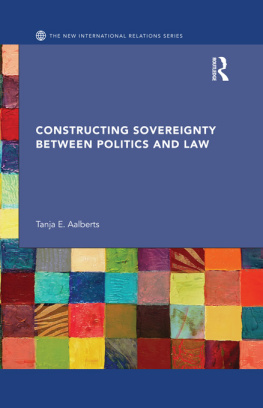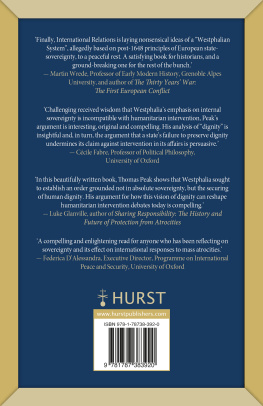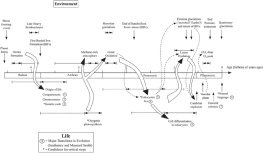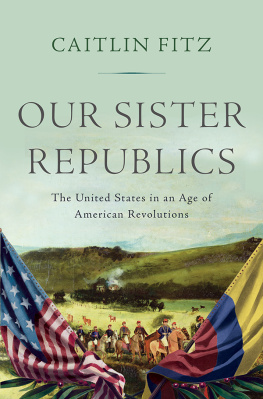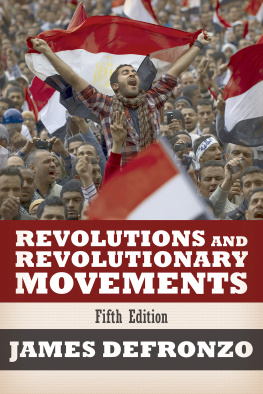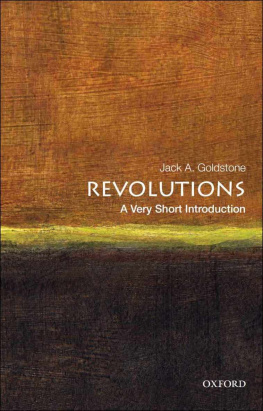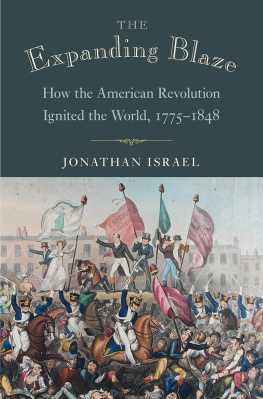REVOLUTIONS IN SOVEREIGNTY
PRINCETON STUDIES IN
INTERNATIONAL HISTORY AND POLITICS
Series Editors
Jack L. Snyder
Marc Trachtenberg
Fareed Zakaria
Recent Titles:
Revolutions in Sovereignty: How Ideas Shaped Modern
International Relations
by Daniel Philpott
After Victory: Institutions, Strategic Restraint, and the Rebuilding of
Order after Major Wars by G. John Ikenberry
Stay the Hand of Vengeance: The Politics of War Crimes Tribunals
by Gary Jonathan Bass
War and Punishment: The Causes of War Termination
and the First World War by H. E. Goemans
In the Shadow of the Garrison State: Americas Anti-Statism
and Its Cold War Grand Strategy by Aaron L. Friedberg
States and Power in Africa: Comparative Lessons in
Authority and Control by Jeffrey Herbst
Entangling Relations: American Foreign Policy in Its Century
by David A. Lake
The Moral Purpose of the State: Culture, Social Identity, and
Institutional Rationality in International Relations
by Christian Reus-Smit
A Constructed Peace: The Making of the European Settlement,
19451963 by Marc Trachtenberg
Regional Orders at Centurys Dawn: Global and Domestic
Influences on Grand Strategy by Etel Solingen
From Wealth to Power: The Unusual Origins of
Americas World Role by Fareed Zakaria
Changing Course: Ideas, Politics, and the Soviet
Withdrawal from Afghanistan by Sarah E. Mendelson
Disarming Strangers: Nuclear Diplomacy with North Korea
by Leon V. Sigal
REVOLUTIONS IN SOVEREIGNTY
HOW IDEAS SHAPED MODERN
INTERNATIONAL RELATIONS
Daniel Philpott

COPYRIGHT2001 BY PRINCETON UNIVERSITY PRESS
PUBLISHED BY PRINCETON UNIVERSITY PRESS, 41 WILLIAM STREET,
PRINCETON, NEW JERSEY 08540
IN THE UNITED KINGDOM: PRINCETON UNIVERSITY PRESS,
3 MARKET PLACE, WOODSTOCK, OXFORDSHIRE OX20 1SY
ALL RIGHTS RESERVED
LIBRARY OF CONGRESS CATALOGING-IN-PUBLICATION DATA
PHILPOTT, DANIEL, 1967
REVOLUTIONS IN SOVEREIGNTY: HOW IDEAS SHAPED MODERN
INTERNATIONAL RELATIONS / DANIEL PHILPOTT.
P. CM.
INCLUDES BIBLIOGRAPHICAL REFERENCES AND INDEX.
ISBN 0-691-05746-X (CL : ALK. PAPER)
ISBN 0-691-05747-8
(PB : ALK. PAPER)
1. SOVEREIGNTY. 2. INTERNATIONAL RELATIONS. I. TITLE
JZ4034.P48 2001
320.1'5DC21 00-059826
THIS BOOK HAS BEEN COMPOSED IN GALLIARD
PRINTED ON ACID-FREE PAPER
WWW.PUP.PRINCETON.EDU
PRINTED IN THE UNITED STATES OF AMERICA
1 3 5 7 9 10 8 6 4 2
1 3 5 7 9 10 8 6 4 2 (PBK.)
To Mom, Dad, and Grandmother
CONTENTS
ONE
Introduction: Revolutions in Sovereignty
TWO
The Constitution of International Society
THREE
A Brief History of Constitutions of International
Society in the West
FOUR
How Revolutions in Ideas Bring Revolutions
in Sovereignty
PART TWO: THE FOUNDING OF THE SOVEREIGN
STATES SYSTEM AT WESTPHALIA
FIVE
Westphalia as Origin
SIX
The Origin of Westphalia
SEVEN
The Power of Protestant Propositions
PART THREE: THE REVOLUTION OF
COLONIAL INDEPENDENCE: THE GLOBAL
EXPANSION OF WESTPHALIA
EIGHT
Ideas and the End of Empire
NINE
The End of the British Empire: Cashing Out the
Promise of Self-Government
TEN
Revolutionary Ideas in the British Colonies
ELEVEN
Britains Burden of Empire
TWELVE
The Fall of Greater France
PART FOUR: THE REVOLUTIONS
CONSIDERED TOGETHER
THIRTEEN
Conclusion: Two Revolutions, One Movement
TABLES AND FIGURES
Tables
Figures
PREFACE
SCHOLARS EASILY underestimate the dependence of knowledge upon community and friendship. In publishing this first book, I want to acknowledge the fellowship that prepared me for it and accompanied me in writing it. It was a high school teacher, Sally Durrant, who first showed me that studying politics could be rigorous and exuberant. I am ever awed by her passion for the polis and her courage against adversityintimations of Socrates. Two professors at the University of Virginia then inspired me to study and teach politics as a vocation. Michael Joseph Smiths kind mentorship and commitment to the study of ethics in international relations were formative. Kenneth Elzingas example of teacher as servant proposed an attractive vision, too. My advisers in graduate school at Harvard University inspired me both through their own formidable scholarship and their conscientious commitment to my project. Stanley Hoffmanns humanistic learning, Robert Keohanes methodological rigor, Andrew Moravcsiks tenacity, and Bryan Hehirs leadership in integrating faith, learning, and politics all shaped the endeavor. Deeply formative, too, were my friendships in the Graduate Christian Fellowship at Harvard, and in the national graduate ministry of InterVarsity Christian Fellowship. It was there that I gained my deepest sense of vocation. I thank, too, my unusually supportive colleagues and friends in the Political Science Department at the University of California, Santa Barbara. I especially appreciate the help of our chair, Stephen Weatherford, in securing for me an early sabbatical leave.
Many colleagues read and commented upon some portion of the manuscript. I am grateful to them all: Samuel Barkin, Aaron Belkin, Sheri Berman, Allan Castle, Vikram Chand, Houchang Chehabi, Jarat Chopra, Benjamin Cohen, Bruce Cronin, Michael Desch, George Downs, Michael Doyle, Sally Durrant, Colin Elman, Martha Finnemore, Gregory Fox, Aaron Friedberg, Michael Gordon, Rodney Bruce Hall, Chris Hardy, So-hail Hashmi, Kevin Hula, Samuel Huntington, Andrew Hurrell, Robert Jackson, Gary King, Stephen Kocs, Stephen Krasner, Friedrich Kratochwil, William Roger Louis, Kate McNamara, John Mearsheimer, Henry Nau, Brent Nelson, John Owen, Dani Reiter, Timothy Shah, Anne-Marie Slaughter, Daniel Thomas, Stephen Van Evera, Barbara Walter, Alexander Wendt, William Wohlforth, Patrick Wolf, Stewart Wood, Phoebe Yang, and two anonymous reviewers for Princeton University Press. Even where these interlocutors have disagreed with my arguments, I have profited enormously from their reactions. All are responsible for some of the books insights, none for any of its errors.
For financial and institutional support, I thank the Weatherhead Center for International Affairs at Harvard University; the Center for European Studies, Harvard University; the John M. Olin Institute for Strategic Studies, Harvard University; the Research Program on International Security at the Center of International Studies at Princeton University; the Erasmus Institute at the University of Notre Dame; and the Faculty Senate at the University of California, Santa Barbara. For crucial logistical support, I thank the staff at the Institute for Commonwealth Studies, London; the administrators at the Public Records Office, London; and Steve Ashton and Philip Murphy, the assistants at the Bodleian Library and Rhodes House Library, Oxford University. For valuable research assistance, I thank Michael Hall. For helpful proofreading, I thank Jessica Vasquez and Samar Mansour. Finally, I thank Charles Myers at Princeton University Press for his conscientious editorial work, and Joan Hunter for her virtuoso copy editing.
Next page






